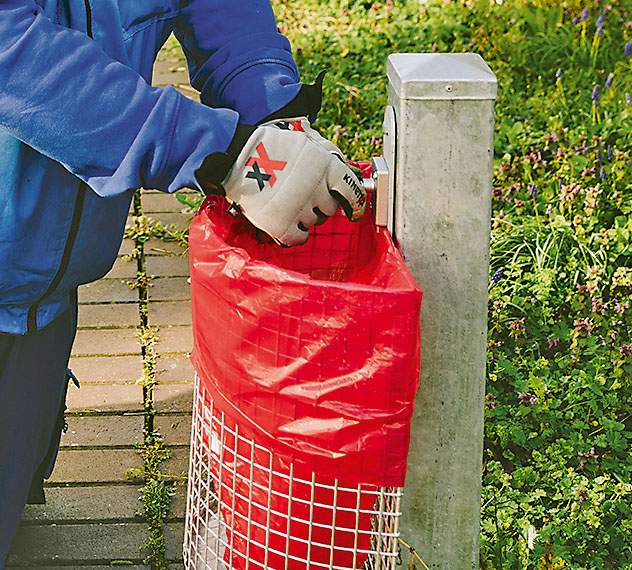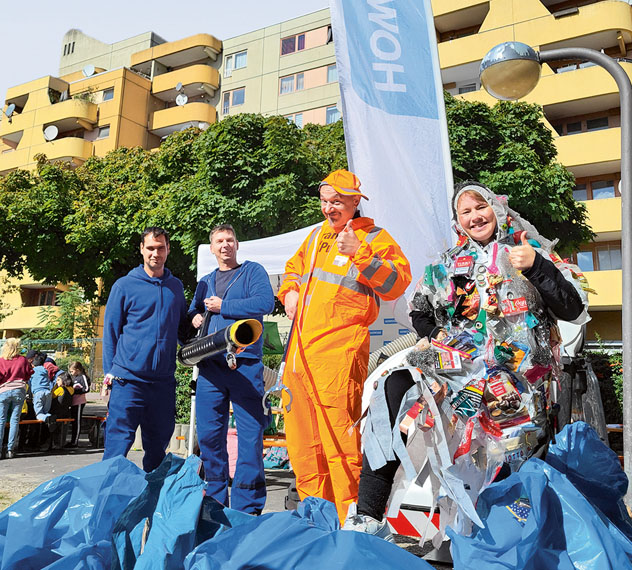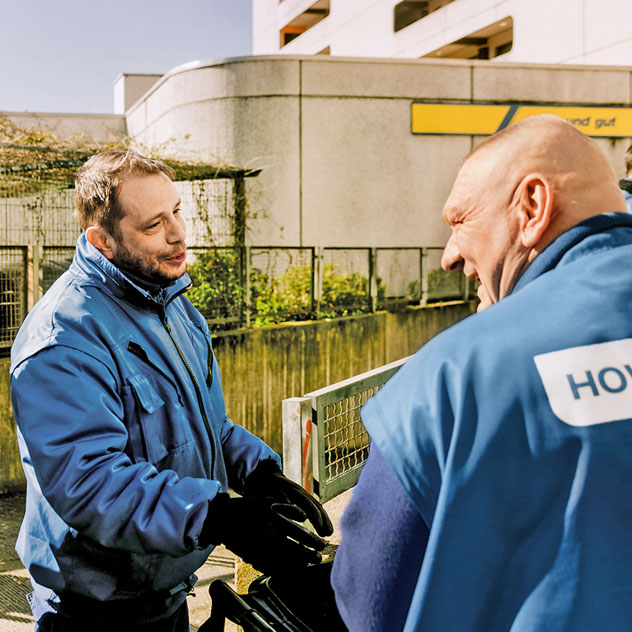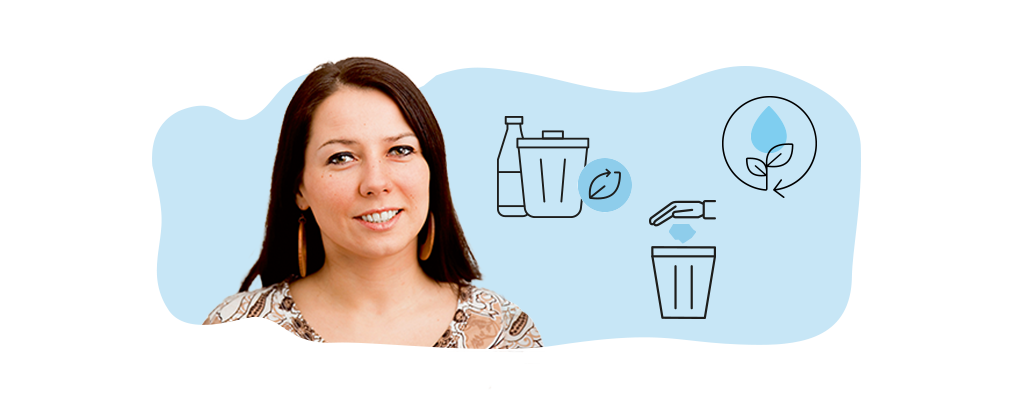For Löprick and his team, that's no reason to despair. On the contrary. They soon identify a major cause of the garbage problem: "If you don't offer people space where the garbage can be disposed of, then it just gets dropped," explains the caretaker. In fact, up until then there hadn't been a single trash can on the high decks, the upper pedestrian walkways of the large housing estate. In 2022, he and his team will therefore install 100 wall-mounted waste bins along the paths on behalf of HOWOGE. First with black bags, later with red ones: "You can see them much better in the wire-woven garbage cans". Success is not long in coming. In just the first three months of this year, janitors are seeing 40 percent less waste on the High Decks. That motivates: "We have fun as a team and we realize that we can achieve something," reports Löprick proudly.
The highest mountain in Africa in the Kilimanjaro massif is 5,895 meters high. Standing in front of such a mountain in order to conquer it requires a great deal of stamina and motivation. Then you can do it. Certainly not overnight, but in many small stages and as a team. This is exactly how Ronny Löprick describes it when he talks about his work. Since HOWOGE took over the housing stock in 2022, he has been employed as a caretaker in the Neukölln High Deck housing estate. Together with his teammates Marcel Hoffmann, Mike Schliebenow, Stephan Schirmer and neighborhood helper Sascha Marhun, he enjoys coming to work every day and takes on the big and small challenges in the neighborhood. Because: Especially in the summer months, when the residents are outside a lot and the playgrounds are full, a lot of waste accumulates here. Empty drinking packets, ice packs, bottles and cans without a deposit - the caretakers collected a total of 500,000 liters of rubbish here in the first year. If you imagine this in standard household water buckets of ten liters each, the mountain of rubbish would be an impressive 50,000 buckets high.


The HOWOGE caretakers in various quarters are increasingly receiving support from the youngest. Environmental education is the keyword, with children and young people learning through play to appreciate their neighborhood and to help shape it in a positive way. Last year, the pupils of the elementary school in the Köllnische Heide, together with the district management, the Britz open-air laboratory and volunteers from the High Deck settlement - including the HOWOGE caretaker team - collected a remarkable 6,000 liters of rubbish within one day and more eight cubic meters of bulky waste. This ultimately resulted in the garbage mountain "Müllimandscharo", analogous to the African mountain massif. "The campaign starts where you can still support the children in raising their awareness of the environment and cleanliness," says Carolin Gwiszcz, a consultant in the Social Management department at HOWOGE. As part of the World Cleanup Day, three school classes from the Jens Nydahl Elementary School also collected waste at the Kottbusser Tor in September 2022. Equipped with garbage grabs, buckets and garbage bags, they came up to 420 liters. Under the motto "Clean up together!", a supporting program including recycling rap provided a lot of motivation and joy for the simplest thing in the world: cleaning up.
Figure: With recycling rap and a big drum roll, the HOWOGE campaign "Clean up together!" at the Kotti became an experience.

This works very well without a raised index finger. It's worth teaching children to enjoy nature conservation instead of admonishing them, explains Gwiszcz. With a class trip voucher worth 2,500 euros, HOWOGE, in friendly cooperation with the Berlin city cleaning service BSR, is going in exactly this direction: "Your clean way to school" is the name of the joint pilot project of both companies, in which the primary schools in the 21 HOWOGE districts are called to to collect rubbish in the vicinity of the school during the summer holidays and to develop creative ideas for a nicer way to school. "The campaign is an important contribution to environmental protection, environmental education and, last but not least, to the sustainability goals of the city of Berlin and HOWOGE," says Gwiszcz, who launched the project together with BSR. After registering, each participating school receives so-called sweeping citizen packages from the BSR with grabbers, gloves, buckets and rubbish bags. Full garbage bags will be picked up and counted free of charge by the city cleaning department. The school group that has collected the most rubbish is awarded at the end and rewarded with a subsidy for the class trip.
Image: The HOWOGE caretakers Ronny Löprick, Sascha Maruhn and Mike Schliebenow (from left) have fun working in the High Deck development.

It is worth teaching children to enjoy nature conservation.
Caroline Gwiszcz | social management

Caretaker Löprick also confirms that alternative approaches work well: "You have to make time for people," he says from his daily experience. Instead of pushing through something with a raised index finger, it is more important to understand each other. After all, up to 50 different nationalities of all ages sometimes live together in Berlin housing estates. Gwiszcz explains that the demands on the shared living environment may be different, but the need for safety and cleanliness for oneself and the family is something that everyone has in common. HOWOGE wants to build on this basis together with the district office and has therefore been using neighborhood caretakers in the HOWOGE quarters at Mehringplatz since May and also at Fennpfuhl from late summer. "The Kiezhausmeisterei was launched in 2021 to actively involve all local people in the maintenance and cleaning of public space and thus not only offer them a better recreational experience, but also to directly involve them in solving the problems, i.e. help to to offer self-help,” explains Gwiszcz. When it comes to cleanliness and safety, sometimes a bridge is needed, someone who participates, supports and mediates on an equal footing. The range of tasks of the neighborhood caretakers ranges from garbage disposal and the removal of unwanted overgrowth to taking on small repairs. At the same time, according to Gwiszcz, they should also be contact persons for the local people. “They offer a helping hand exactly where nobody else feels responsible”. This is how the highest mountain can be conquered in the end: in many small steps and with many helping hands.
